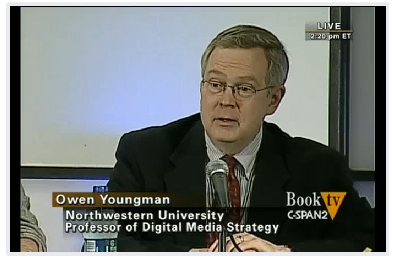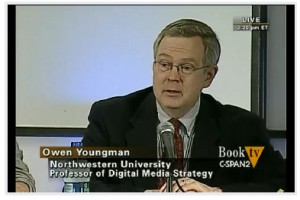The topics and books that were the focus of my principal panel at this year’s Printers Row Lit Fest continue to compel the attention of writers, reviewers and journals.
Sunday’s New York Times Book Review, for instance, held a highly complimentary review of Tom Bissell’s “Extra Lives: Why Video Games Matter.” In the Business section, Steven Johnson took mild exception to some of the premises in Nicholas Carr’s “The Shallows” in a piece called “Yes, People Still Read, but Now It’s Social.” And Carr’s busy blog, Rough Type, pointed me to the online version of the latest Nieman Reports, where Jack Fuller shares part of what he learned in researching and writing “What Is Happening to News” in a piece entitled “Feeling the Heat: The Brain Holds Clues for Journalism.” (Nieman also includes a link to Chapter 6 of the book, one of those I’ve been teaching at Medill this past academic year.)
In short, we’re long on discussion of the impact of technology on our cognitive abilities; of the continuing evolution of narrative; and of the changes wrought in and on our culture by the various media revolutions of the past 20 years. You can get a flavor by watching (all or some of) C-SPAN’s 47-minute video from Printers Row, available by clicking on the photo at right.
I can’t end this particular linkfest without doubling back yet again to the NYT and its magazine cover story Sunday about a computer system that has been built to play “Jeopardy!” The interactive simulation that accompanies the online version was nearly as compelling as the article … enough so that I didn’t get distracted while playing it (nor, come to think of it, was I distracted while reading. This is a good sign). Watching “Jeopardy!” today after having read the piece was to be reminded of just how tricky those clues really are, and what a feat of programming it is to “teach” a machine to parse them out.
If I were so inclined, I suppose I could worry that by the time an IBM system is ready to have a real conversation with a human being, all the available humans will have, in Carr’s memorable construction, outsourced their memories to Google. For another day.


